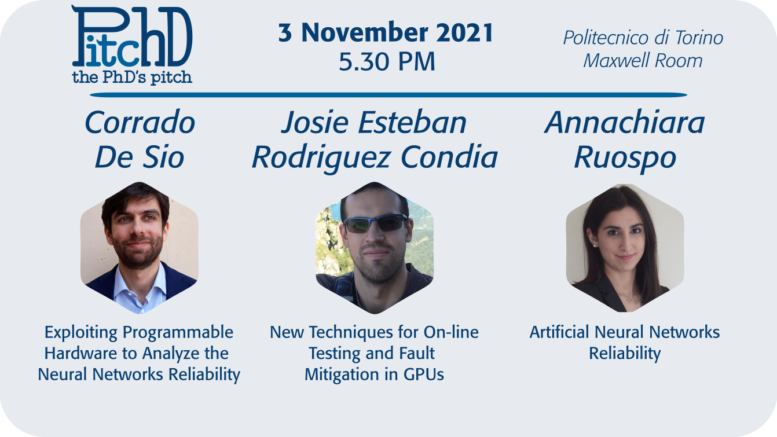3 November 2021 – 5.30 PM CET
IN-PRESENCE EVENT
Venue: Politecnico di Torino – Maxwell Room
You are invited to the 6th PitchD – the PhD’s pitch. Our PhD IEEE Student Members explain to students, colleagues and professors their research in-presence. Please register below.

Exploiting Programmable Hardware to Analyze the Neural Networks Reliability
Mr. Corrado De Sio
Dept. of Control and Computer Engineering (DAUIN), Politecnico di Torino
Complexity of modern neural network has grown dramatically in recent years, requiring hardware-acceleration-based solutions to deal with the demanded computational complexity. The reliability evaluation of neural networks is still premature and requires platforms to measure the safety standards required by safety-critical applications such as automotive and avionic. Software-level simulation approaches have been consolidated as the most common method to assess the reliability of neural network systems through simulation/emulation, often ignoring the underlying hardware. In this talk, the limitation of an analysis based only on a software-level approach is discussed. A new methodology for evaluating the resiliency of neural networks by using programmable hardware is presented as an alternative.
New Techniques for On-line Testing and Fault Mitigation in GPUs
Mr. Josie Esteban Rodriguez Condia
Dept. of Control and Computer Engineering (DAUIN), Politecnico di Torino
Graphics Processing Units (GPUs) are crucial devices that boost the execution of complex algorithms in the scientific and artificial intelligence domains. Moreover, GPUs are also relevant components now included in several safety-critical applications (e.g., automotive, and autonomous machines), where reliability and functional safety are essential requirements. This speech focuses on the exploration and development of new in-field techniques aiming to test and mitigate faults affecting GPUs. For this purpose, a functional testing mechanism (Software-Based Self-Test or SBST) is exploited to propose or adopt several test strategies for GPUs. Finally, hybrid mechanisms are proposed and evaluated targeting the in-field mitigation of fault in GPUs. According to experimental results, both in- field testing and mitigation mechanisms can be considered fault-tolerance solutions for GPU devices.
Artificial Neural Networks Reliability
Ms. Annachiara Ruospo
Dept. of Control and Computer Engineering (DAUIN), Politecnico di Torino
In the last few decades, the growing complexity of emerging computing systems has called for enhanced computing paradigms. Among all the existing possibilities, artificial intelligence (AI) based solutions and, specifically, brain-inspired computing models, have gained large interest in the industry and academia for their outstanding computational capabilities. Nowadays, the usage of electronic devices running applications based on Artificial Neural Networks (ANNs) is spreading in our everyday life. In fact, ANNs are now considered attractive solutions for different areas including safety-critical applications such as self-driving cars, radars, flight control, robots, and space applications. Often, ANNs are considered intrinsically robust and fault tolerant for being brain-inspired and redundant computing models. However, when they are deployed on resource-constrained hardware devices, single physical faults might jeopardize the activity of multiple neurons, leading to unwanted outcomes. Therefore, to use them safely in human contexts, there is a compelling need for assessing their reliability and tolerance to faults.
Download the flyer:
![]()

